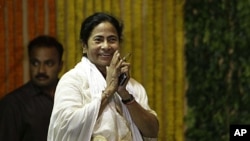In India, impressive victories scored by two women in regional elections have increased the number of women in the top rungs of politics. But women's political empowerment is only making slow progress in a country where they occupy a tiny number of seats in parliament and state legislatures.
When results from regional elections were announced recently, the spotlight was on two women who routed their rivals. Mamata Banerjee ended 34 years of rule by communist parties to take control of West Bengal. In Tamil Nadu in the south, J. Jayalalitha, staged a comeback by ousting a regional rival.
Along with two women chief ministers who head Delhi and Uttar Pradesh states, women now govern more Indians than ever before, says independent political analyst Mahesh Rangarajan.
"At this moment, if you look at how many Indians live in states which have women chief ministers, it is a little less than one in three," noted Rangarajan. "Something like 30 percent of the people in India are living in a state or territory where the head of government is a woman. That is probably unusual."
The four chief ministers now in power are not the only women in the top rungs of government. The head of the ruling Congress Party, Sonia Gandhi, is India's most powerful politician. The president, parliament speaker and the opposition leader are all women.
But analysts say the sprinkling of women at the top does not mean that women have gained significantly greater influence in politics. Women account for a little more than 10 percent of parliament and even smaller ratios in state assemblies, lagging behind neighboring countries like Pakistan and Nepal.
Ranjana Kumari heads the Center for Social Research in New Delhi and has been at the forefront of a campaign to reserve one-third of seats in parliament and state legislatures for women. Activists like Kumari hope that the Women's Reservation Bill will finally be passed this year, after facing a 14-year-deadlock because of stormy opposition from some regional parties.
"It is at the apex and the national level leadership that women are not getting any positions," Kumari noted. "It is a huge contradiction also, because you do see five major parties being headed by women, major, major states in the country are now seeing women as chief ministers. So, when it comes to top level leadership they are acceptable, but when it comes to really women sharing power, sitting with men in parliament and also state assemblies, men do not want to vacate more seats. It is an important time now when we will see such a process is started."
Political analysts point to some positive features of women's political empowerment. In the past, most women politicians belonged to powerful political families. Some, like Sonia Gandhi, wife of former prime minister Rajiv Gandhi, still do. But others are making it on their own accord.
For example, Mamata Banerjee in West Bengal founded her own party, the Trinamool Congress, and made it a political force to reckon with. In Uttar Pradesh state, Mayawati (one name only), has emerged as a powerful lower caste leader in her own right. They are regarded as tough leaders who have carved out their own identities.
Political analyst Mahesh Rangarajan says a strong family connection is no longer necessary for women.
"It is not that it is somebody's wife, sister, daughter or even daughter-in-law. Perhaps that is something one should sit up and take notice of. It is not a clan network that has put these women in charge. These are self-made women who have often overcome enormous adversity and managed to come to power," Rangarajan explained.
Activists hope that more political space for women will improve the position of women in a society where they face widespread discrimination and where sex selective abortions are blamed for declining ratio of girls to boys.
But observers say there is no evidence the women who have ruled states have made any impact on the social status of women. They say that, even in their own governments, there has been no effort to increase the number of women.
Professor Zoya Hasan teaches politics at New Delhi's Jawaharlal Nehru University.
"Most of these women are anxious not be seen as representing women, or being friendly to women, or be doing things for women. Most of these women chief ministers just want to be seen as chief ministers. Period," Hasan noted.
Like other politicians, many women leaders have also been touched by controversy. Jayalalitha has faced allegations of corruption. Delhi's chief minister, Sheila Dikshit, has been blamed for not preventing massive corruption in the organization of last year's Commonwealth Games.
Number of Indian Women in Top Posts Rises




